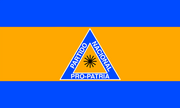The National Party of the Fatherland[9] (Spanish: Partido Nacional "Pro-Patria"), usually translated as the National Pro Patria Party[10] or simply the Pro Patria Party,[8] was a far-right political party which was the sole-legal political party in El Salvador from its establishment in 1933 until its dissolution in 1945. The party was founded by President General Maximiliano Hernández Martínez to support his government.
National Party of the Fatherland Partido Nacional "Pro-Patria" | |
|---|---|
 | |
| Abbreviation | PNPP |
| Leader | Maximiliano Hernández Martínez |
| Founded | June 1933 |
| Dissolved | 1945 |
| Preceded by | National Republican Party |
| Headquarters | San Salvador |
| Ideology | |
| Political position | Far-right |
| Religion | Catholicism[citation needed] |
| Colors | Blue |
| Slogan |
|
| Legislative Assembly (1944) | 42 / 42 |
| Party flag | |
 | |
History edit
The National Pro Patria Party was founded in June 1933 by General Maximiliano Hernández Martínez, the acting president of El Salvador, to support his presidential campaign for the upcoming 1935 presidential election.[9] The National Pro Patria Party was the country's sole-legal political party.[11] The party was governed by the supreme council, which was composed of Hernández Martínez, members of his cabinet, and other high ranking government officials.[12] It had its first meeting in July 1933.[9]
In the 1935 election, Hernández Martínez was the only candidate, winning all 329,555 votes.[13] He again ran unopposed in the 1939 presidential election, where he again won all 210,810 votes,[14] and again in 1944, however, no results were published.
After an attempted coup and widespread student protests against his government, Hernández Martínez resigned and fled the country in May 1944. He was succeeded by Andrés Ignacio Menéndez, but he was deposed by Osmín Aguirre y Salinas in October 1944, ending the rule of the National Pro Patria Party.[14] The party was declared to be dissolved by the Salvadoran government in 1945.[14]
Electoral history edit
Presidential elections edit
| Election | Party candidate | Votes | % | Result | Ref |
|---|---|---|---|---|---|
| 1935 | Maximiliano Hernández Martínez | 329,555 | 100.00 | Elected | [14] |
| 1939 | Maximiliano Hernández Martínez | 210,810 | 100.00 | Elected | [14] |
| 1944 | Maximiliano Hernández Martínez | No results published | Elected | ||
| 1945 | No leader | did not run | Lost | ||
Legislative Assembly elections edit
| Election | Party leader | Votes | % | Position | Seats | +/– | Status in legislature | Ref |
|---|---|---|---|---|---|---|---|---|
| 1936 | Maximiliano Hernández Martínez | No results published | 1st | 42 / 42
|
42 | Sole legal party | [14] | |
| 1939 | 210,810 | 100.00 | 1st | 42 / 42
|
0 | Sole legal party | [14] | |
| 1944 | No results published | 1st | 42 / 42
|
0 | Sole legal party | |||
References edit
Citations edit
- ^ Astilla 1976, pp. 148, 151.
- ^ Luna, David (2000). University of El Salvador (ed.). Analisis de una dictadura fascista latinoamericana. Maximiliano Hernandez Martinez, 1931-1944.
- ^ Wood, Andrew G. (2014). Oxford University Press (ed.). Agustin Lara: A Cultural Biography. Oxford University Press. p. 99. ISBN 9780199892464.
- ^ Leonard, Thomas M.; Bratzel, John F. (2007). Rowman & Littlefield (ed.). Latin America During World War II. Rowman & Littlefield. p. 9. ISBN 9780742537415.
- ^ Middlebrook, Kevin J. (2000). Johns Hopkins University Press (ed.). Conservative Parties, the Right, and Democracy in Latin America. Johns Hopkins University Press. p. 175. ISBN 9780801863851.
- ^ Peñate, Oscar Martínez (2003). El Salvador Sociologia General. Oscar martinez peñate. p. 88. ISBN 9789992380031.
- ^ Dimas, Roldán (2013). Xlibris Corporation (ed.). El Ultimo Latido de una Madre. Xlibris Corporation. p. 44. ISBN 9781483699448.
- ^ a b Escobar Rodríguez 2017, p. 1.
- ^ a b c Lauria Santiago & Binford 2004, p. 60.
- ^ Dunkerley 1998, p. 111.
- ^ Lindo Fuentes, Ching & Lara Martínez 2007, pp. 82–83.
- ^ Lauria Santiago & Binford 2004, p. 61.
- ^ Lauria Santiago & Binford 2004, pp. 67–68.
- ^ a b c d e f g "Elections and Events 1935–1969". University of California, San Diego. Archived from the original on 20 July 2020. Retrieved 20 July 2020.
Bibliography edit
- Astilla, Carmelo Francisco Esmeralda (1976). "The Martinez Era: Salvadoran-American Relations, 1931–1944". Louisiana State University and Agricultural & Mechanical College.
- Dunkerley, James (1998). British Documents on Foreign Affairs: Reports and Papers from the Foreign Office Confidential Print: South and Central America, January 1941–December 1941. Vol. 2. University Publications of America. ISBN 9781556556739. Retrieved 5 July 2020.
- Escobar Rodríguez, Ahildo Enrique (2017). El Partido Pro Patria 1933–1944 (in Spanish). San Salvador: University of El Salvador.
- Lauria Santiago, Aldo; Binford, Leigh (2004). Landscapes of Struggle: Politics, Society, and Community in El Salvador. University of Pittsburgh Press. ISBN 9780822972549.
- Lindo Fuentes, Héctor; Ching, Erik & Lara Martínez, Rafael A. (2007). Remembering a Massacre in El Salvador: The Insurrection of 1932, Roque Dalton, and the Politics of Historical Memory. Albuquerque, New Mexico: University of New Mexico Press. ISBN 978-0-8263-3604-0.